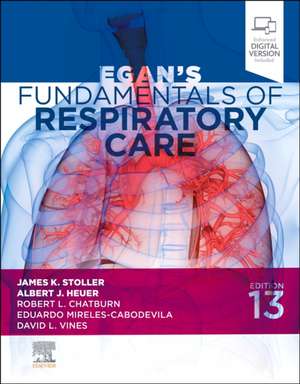Egan's Fundamentals of Respiratory Care
Editat de James K. Stoller, Albert J. Heuer, David L. Vines, Robert L. Chatburn, Eduardo Mireles-Cabodevilaen Limba Engleză Paperback – 26 mar 2024
Master the principles and skills you’ll need to succeed as a respiratory therapist! Egan’s Fundamentals of Respiratory Care, 13th Edition provides a solid foundation in respiratory care and covers the latest advances in this dynamic field. For more than 50 years, this text has been the go-to resource to understand the role of the respiratory therapist, the scientific basis for treatment, and clinical applications. Comprehensive chapters prepare you for clinical and exam success by correlating to the 2020 NBRC Exam matrices. The 13th Edition includes updated coverage of COVID-19, the latest AARC clinical practice guidelines, and a new enhanced eBook version included with print purchase.
Preț: 809.38 lei
Preț vechi: 1071.68 lei
-24% Nou
Puncte Express: 1214
Preț estimativ în valută:
154.92€ • 168.34$ • 130.22£
154.92€ • 168.34$ • 130.22£
Carte disponibilă
Livrare economică 24 martie-07 aprilie
Livrare express 14-20 martie pentru 351.46 lei
Preluare comenzi: 021 569.72.76
Specificații
ISBN-13: 9780323931991
ISBN-10: 0323931995
Pagini: 1416
Dimensiuni: 216 x 276 x 51 mm
Greutate: 3.06 kg
Ediția:13
Editura: Elsevier
ISBN-10: 0323931995
Pagini: 1416
Dimensiuni: 216 x 276 x 51 mm
Greutate: 3.06 kg
Ediția:13
Editura: Elsevier
Cuprins
1 Early History of Respiratory Care
2 The Profession of Respiratory Care
3 Quality, Patient Safety, and Communication
4 Principles of Infection Prevention and Control
5 Ethical and Legal Implications of Practice
6 Physical Principles of Respiratory Care
7 E-Medicine in Respiratory Care
8 Fundamentals of Respiratory Care Research
9 The Respiratory System
10 The Cardiovascular System
11 Ventilation
12 Gas Exchange and Transport,
13 Solutions, Body Fluids, and Electrolytes
14 Acid-Base Balance
15 Regulation of Breathing
16 Bedside Assessment of the Patient
17 Interpreting Clinical and Laboratory Data
18 Interpreting the Electrocardiogram
19 Analysis and Monitoring of Gas Exchange
20 Pulmonary Function Testing
21 Review of Thoracic Imaging
22 Flexible Bronchoscopy and the Respiratory Therapist
23 Nutrition Assessment
24 Pneumonia
25 Obstructive Lung Disease: Chronic Obstructive Pulmonary Disease (COPD), Asthma, and Related Diseases
26 Interstitial Lung Disease
27 Pleural Diseases
28 Pulmonary Vascular Disease
29 Acute Respiratory Distress Syndrome
30 Respiratory Management of Trauma, Obesity, Near Drowning, and Burns
31 Acute Heart Failure
32 Lung Cancer
33 Neuromuscular and Other Diseases of the Chest Wall
34 Disorders of Sleep
35 Neonatal and Pediatric Respiratory Disorders
36 Airway Pharmacology
37 Airway Management
38 Emergency Cardiovascular Life Support
39 Humidity and Bland Aerosol Therapy
40 Aerosol Drug Therapy
41 Storage and Delivery of Medical Gases
42 Medical Gas Therapy
43 Lung Expansion Therapy
44 Airway Clearance Therapy
45 Respiratory Failure and the Need for Ventilatory Support
46 Mechanical Ventilators
47 Physiology of Ventilatory Support
48 PatienteVentilator Interactions
49 Initiating and Adjusting Invasive Ventilatory Support
50 Noninvasive Ventilation
51 Extracorporeal Life Support
52 Monitoring the Patient in the Intensive Care Unit
53 Discontinuing Ventilatory Support
54 Neonatal and Pediatric Respiratory Care
55 Health Promotion Through Patient Education
56 Cardiopulmonary Rehabilitation
57 Respiratory Care in Alternative Settings
58 Ethics and the End of Life
2 The Profession of Respiratory Care
3 Quality, Patient Safety, and Communication
4 Principles of Infection Prevention and Control
5 Ethical and Legal Implications of Practice
6 Physical Principles of Respiratory Care
7 E-Medicine in Respiratory Care
8 Fundamentals of Respiratory Care Research
9 The Respiratory System
10 The Cardiovascular System
11 Ventilation
12 Gas Exchange and Transport,
13 Solutions, Body Fluids, and Electrolytes
14 Acid-Base Balance
15 Regulation of Breathing
16 Bedside Assessment of the Patient
17 Interpreting Clinical and Laboratory Data
18 Interpreting the Electrocardiogram
19 Analysis and Monitoring of Gas Exchange
20 Pulmonary Function Testing
21 Review of Thoracic Imaging
22 Flexible Bronchoscopy and the Respiratory Therapist
23 Nutrition Assessment
24 Pneumonia
25 Obstructive Lung Disease: Chronic Obstructive Pulmonary Disease (COPD), Asthma, and Related Diseases
26 Interstitial Lung Disease
27 Pleural Diseases
28 Pulmonary Vascular Disease
29 Acute Respiratory Distress Syndrome
30 Respiratory Management of Trauma, Obesity, Near Drowning, and Burns
31 Acute Heart Failure
32 Lung Cancer
33 Neuromuscular and Other Diseases of the Chest Wall
34 Disorders of Sleep
35 Neonatal and Pediatric Respiratory Disorders
36 Airway Pharmacology
37 Airway Management
38 Emergency Cardiovascular Life Support
39 Humidity and Bland Aerosol Therapy
40 Aerosol Drug Therapy
41 Storage and Delivery of Medical Gases
42 Medical Gas Therapy
43 Lung Expansion Therapy
44 Airway Clearance Therapy
45 Respiratory Failure and the Need for Ventilatory Support
46 Mechanical Ventilators
47 Physiology of Ventilatory Support
48 PatienteVentilator Interactions
49 Initiating and Adjusting Invasive Ventilatory Support
50 Noninvasive Ventilation
51 Extracorporeal Life Support
52 Monitoring the Patient in the Intensive Care Unit
53 Discontinuing Ventilatory Support
54 Neonatal and Pediatric Respiratory Care
55 Health Promotion Through Patient Education
56 Cardiopulmonary Rehabilitation
57 Respiratory Care in Alternative Settings
58 Ethics and the End of Life
